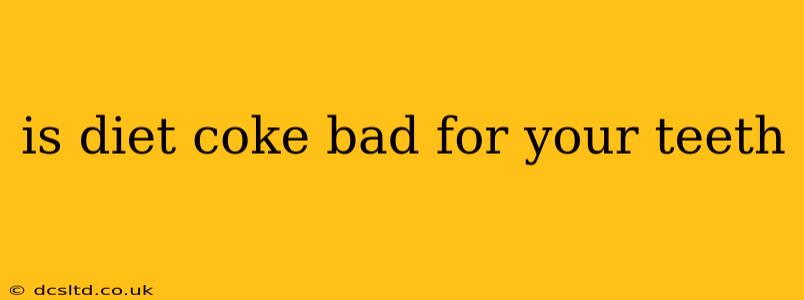Diet Coke, and other diet sodas, are often marketed as a healthier alternative to their sugary counterparts. But are they truly better for your teeth? The short answer is: it's complicated. While they lack the sugar that fuels cavity-causing bacteria, diet sodas pose other risks to your oral health. This article will delve into the specifics, answering common questions and providing you with the information you need to make informed choices about your beverage consumption.
Does Diet Coke Cause Tooth Decay?
While Diet Coke doesn't contain sugar, it still contains acids that can erode tooth enamel. These acids, primarily phosphoric and citric acid, lower the pH in your mouth, making it more acidic. This acidic environment weakens enamel, increasing your susceptibility to cavities and sensitivity. The prolonged exposure to these acids, especially frequent sipping throughout the day, is more damaging than a single serving.
Is Diet Coke Worse Than Regular Coke for Your Teeth?
This is a crucial question. While regular Coke contains sugar, directly contributing to bacterial growth and acid production, Diet Coke's acidity is a significant concern. Some studies suggest that the acidity in diet soda might be more damaging to enamel than the sugar in regular soda because the sugar is metabolized, while the acid remains. However, the overall impact depends on individual factors and consumption habits. Moderation is key with both.
How Does Diet Coke Affect Tooth Enamel?
The acids in Diet Coke attack the enamel, the hard outer layer of your teeth, leading to enamel erosion. This erosion can cause increased sensitivity to hot and cold temperatures, staining, and ultimately, cavities. Over time, significant enamel loss can lead to irreversible damage and the need for more extensive dental work.
What are the Long-Term Effects of Drinking Diet Coke?
Chronic consumption of Diet Coke and other diet sodas can lead to several long-term oral health problems, including:
- Increased Tooth Sensitivity: As enamel erodes, the underlying dentin becomes exposed, making your teeth more sensitive to temperature changes and pressure.
- Tooth Staining: While Diet Coke doesn't contain sugar that promotes bacterial staining, the acids can make your teeth more porous and susceptible to staining from other sources.
- Cavities: Weakened enamel makes your teeth more vulnerable to cavities.
- Dental Erosion: Severe enamel erosion can lead to visible damage and even the need for restorative dental procedures.
How Can I Protect My Teeth When Drinking Diet Coke?
If you choose to drink Diet Coke, consider these protective measures:
- Limit Consumption: Reduce your intake of diet soda as much as possible. The less you drink, the less your teeth are exposed to harmful acids.
- Drink Quickly: Instead of sipping it slowly throughout the day, drink it quickly to minimize the duration of acid exposure.
- Rinse Your Mouth: After consuming Diet Coke, rinse your mouth with water or fluoride mouthwash to help neutralize the acids.
- Wait to Brush: Wait at least 30 minutes after consuming acidic drinks before brushing your teeth. Brushing immediately can further erode weakened enamel.
- Maintain Good Oral Hygiene: Brush and floss regularly, and schedule regular checkups with your dentist for professional cleanings and examinations.
Is Diet Soda Better Than Water?
The answer is a resounding yes, water is significantly better for your teeth. Water helps neutralize acids in your mouth, cleanses your teeth, and promotes overall oral health. It's always the best option for hydration.
In Conclusion:
While Diet Coke avoids the sugar that directly contributes to cavities, its high acidity presents a significant threat to your enamel. Moderation, coupled with good oral hygiene practices, is essential to minimize the potential damage. Remember, water remains the healthiest choice for your teeth and overall well-being. Consult with your dentist for personalized advice on maintaining optimal oral health.
